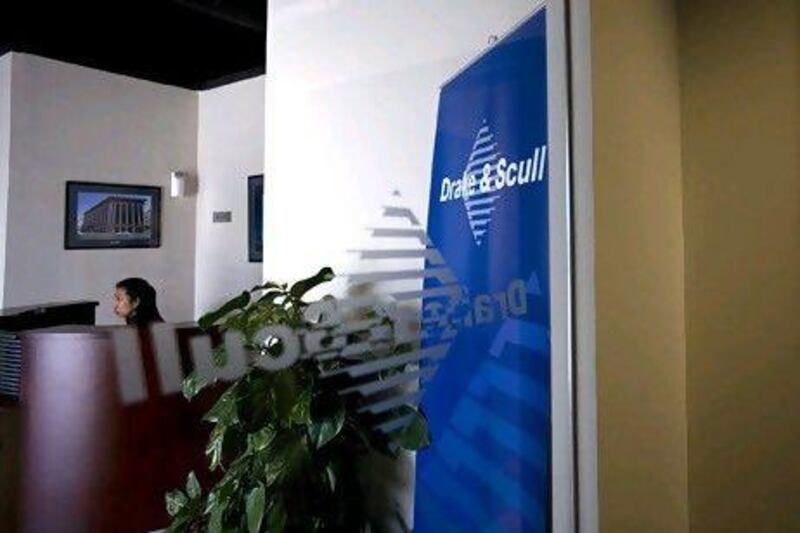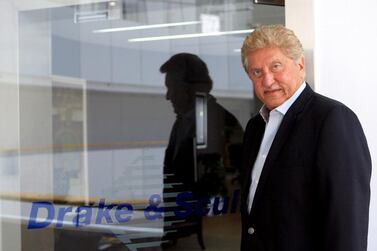Who is Khaldoun Tabari?
Mr Tabari is a Jordanian businessman who first bought a stake in Dubai-based contractor Drake & Scull in 1998 and was its second-biggest shareholder at the time of its 2008 IPO, when it raised Dh1.22bn in an offer that was 101-times oversubscribed.
After its float, as conditions for contractors in the UAE worsened, the company expanded overseas — including into markets like Libya and Syria — and went on an acquisition spree buying businesses in India Germany, and a company in Saudi Arabia that allowed it to move into general contracting.
What is he accused of?
The company’s current management filed 15 initial charges with the Abu Dhabi public prosecutor’s office on matters ranging from fraud and embezzlement to forgery. In a statement last week, it said fresh criminal charges had also been filed with the Abu Dhabi Public Funds Prosecutor against Mr Tabari, family members and other executive managers. It also said criminal complaints had been filed against Mr Tabari and his daughter, Zeina (the company's former head of investor relations) in Jordan.
So what happened?
What isn’t in doubt is that the company’s expansion plans went awry. Geopolitical tensions put paid to its businesses in Libya and Syria, and the 2014 decline in oil prices not only stymied its move into general contracting, it also meant the company was struggling to recoup payments for work carried out. It declared losses of Dh826.6m in 2015 and Dh732.9m in 2016, leading Mr Tabari to step down as chief executive in August 2016. The company's next chief executive, Wael Allan, developed a turnaround plan that involved bringing in new investment.
A deal agreed with private equity firm Tabarak Investment Company involved Drake & Scull reducing its share capital by 75 pr cent to extinguish accumulated losses of Dh1.7bn, wiping the slate clean ahead of a Dh500m equity injection. Mr Tabari agreed to sell his shares in February 2017 as part of this process.
The new funding eventually came in October 2017, and although the company declared a profit for the first quarter of 2018, hopes of a revival faded quickly. A rapid decline in its fortunes led to the company's shares being suspended from DFM in November 2018 and its last filed accounts for the 2018 financial year show a full-year loss of Dh4.5bn on revenue of Dh798m, leaving the company with negative net equity of almost Dh4.75bn.
How did things go so wrong so quickly?
This is the key sticking point in the dispute. By June 2018, less than nine months since funds were injected, the company announced it had completed an investigation into “violations” by its previous management and had passed on findings to the relevant UAE authorities. A statement issued accompanying its 2018 accounts in April last year cited 15 complaints to the UAE public prosecutor dating back to its 2008 IPO and cover "'questionable acquisitions by Drake & Scull of companies belonging to members of the previous executive management in 2009-2011", according to a statement published last year.
It said the restructuring plan that Tabarak as strategic investor had used as its basis of investment had been developed on the back of "false information of backlog value, misrepresented projects' profitability and percentage of completion" .
“Furthermore, the report omitted material information, including the number and status of overwhelming legal cases against the company, and concealing the true liquidity needs of the company which far exceeded the Dh500 million dirhams injected,” the statement said.
Mr Tabari argued this is a smokescreen to cover mismanagement. He said that from the sale agreement in February 2017 until funds were injected in October, the company had eight months to complete due diligence. In his statement, he blamed Drake & Scull's subsequent demise on a “clear lack of strategy”, pointing to the fact that Drake & Scull replaced five chief executives in a period of just over two years, and said an inability to effectively manage the business led to the departure of key executives and technical staff, meaning they were unable to fulfil contracts.
In a statement published on Wednesday in response to his claims, Tabarak said DSI "is managed by a highly qualified and experienced board of directors working independently and without any supervision from Tabarak".
It said that as one of the shareholders in Drake & Scull, it is "following the measures taken and complaints filed against members of the previous executive management, as well as the results of investigations carried out by the UAE Public Prosecutor and all other related developments inside and outside the country".








